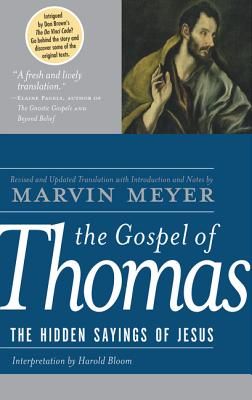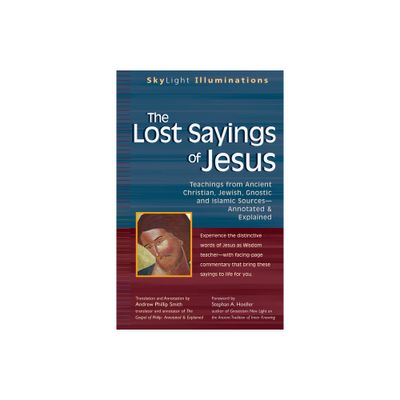Home
The Gospel of Thomas: a collection of traditional Sayings of Jesus
Loading Inventory...
Barnes and Noble
The Gospel of Thomas: a collection of traditional Sayings of Jesus
Current price: $5.99


Barnes and Noble
The Gospel of Thomas: a collection of traditional Sayings of Jesus
Current price: $5.99
Loading Inventory...
Size: OS
*Product Information may vary - to confirm product availability, pricing, and additional information please contact Barnes and Noble
The Gospel According to Thomas, commonly shortened to the Gospel of Thomas, is a well preserved early Christian, non-canonical sayings-gospel which many scholars believe provides insight into the Oral gospel traditions. It was discovered near Nag Hammadi, Egypt, in December 1945, in one of a group of books known as the Nag Hammadi library. The Gospel of Thomas was found among a collection of fifty-two writings that included, in addition to an excerpt from Plato's Republic, gospels claiming to have been written by Jesus's disciple Philip. Scholars have speculated that the works were buried in response to a letter from Bishop Athanasius who for the first time declared a strict canon of Christian scripture. [1] The Coptic language text, the second of seven contained in what modern-day scholars have designated as Codex II, is composed of 114 sayings attributed to Jesus.[2] Almost half of these sayings resemble those found in the Canonical Gospels, while it is speculated that the other sayings were added from Gnostic tradition.[3] Its place of origin may have been Syria, where Thomasine traditions were strong.[4] The introduction states: "These are the hidden words that the living Jesus spoke and Didymos Judas Thomas wrote them down."[5] Didymus (Greek) and Thomas (Aramaic) both mean "twin". Some critical scholars suspect that this reference to the Apostle Thomas is false, and that therefore the true author is unknown.[6] It is possible that the document originated within a school of early Christians, possibly proto-Gnostics.[7] Some critics further claim that even the description of Thomas as a "gnostic" gospel is based upon little other than the fact that it was found along with gnostic texts at Nag Hammadi.[8] The name of Thomas was also attached to the Book of Thomas the Contender, which was also in Nag Hammadi Codex II, and the Acts of Thomas. It is important to note, however, that while the Gospel of Thomas does not directly point to Jesus' divinity, it also does not directly contradict it, and therefore neither supports nor contradicts gnostic beliefs. When asked his identity in the Gospel of Thomas, Jesus usually deflects, ambiguously asking the disciples why they do not see what is right in front of them. This is similar to passages in the canonical gospels like John 12:16 and Luke 18:34. The text itself, however, continuously reflects Gnostic teachings by continuously referring to Jesus's sayings as "secret" and "mysterious", which were common gnostic catchphrases.


















